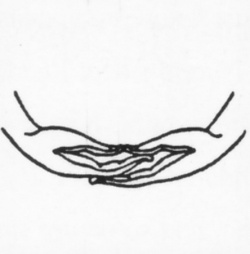Difference between revisions of "Dhyāna Mudrā"
| (6 intermediate revisions by the same user not shown) | |||
| Line 3: | Line 3: | ||
[[Meditation]] Gesture | [[Meditation]] Gesture | ||
Sjoquist p. 33 [[Dhyāna Mudrā]] | Sjoquist p. 33 [[Dhyāna Mudrā]] | ||
| − | + | [[chándìng yìn]] [[禅定印 禪定印]] or [[dìng yìn]] [[定印]] | |
| − | This gesture indicates [[Meditation]], or more exactly the [[highest]] state of [[tranquility]] ([[Samādhi]] or sānmótí 三摩提). Although long used in [[India]] as a position for the hands during [[Meditation]], in [[Buddhist]] [[Art]] this gesture is usually associated with [[Buddhas]], therefore usually [[Sakyamuni]] or [[Shìjiāmóuní fó]] [[释迦牟尼佛]] | + | This gesture indicates [[Meditation]], or more exactly the [[highest]] [[state]] of [[tranquility]] ([[Samādhi]] or [[sānmótí]] [[三摩提]]). |
| − | (A [[begging bowl]] may be held atop the hands. When a [[medicine]] [[bowl]] is shown there, the figure is often [[Bhaiṣajyaguru]], known in {{Wiki|Chinese}} as simply [[Yàoshī fó]] [[药师佛 药师佛 藥師佛]], which means “[[Medicine Master Buddha]],” associated with [[Healing]]. Or it is Ēmítuó fó | + | |
| + | Although long used in [[India]] as a position for the hands during [[Meditation]], in [[Buddhist]] [[Art]] this gesture is usually associated with [[Buddhas]], therefore usually [[Sakyamuni]] or [[Shìjiāmóuní fó]] [[释迦牟尼佛 釋迦牟尼佛]] and [[Amitābha]] or [[Ēmítuó fó]] [[阿弥陀佛 阿彌陀佛]]. | ||
| + | |||
| + | (A [[begging bowl]] may be held atop the hands. When a [[medicine]] [[bowl]] is shown there, the figure is often [[Bhaiṣajyaguru]], known in {{Wiki|Chinese}} as simply [[Yàoshī fó]] [[药师佛 药师佛 藥師佛]], which means “[[Medicine Master Buddha]],” associated with [[Healing]]. | ||
| + | |||
| + | Or it is [[Ēmítuó fó]] [[阿弥陀佛 阿彌陀佛]] ([[Amithābha]]), especially if both hands remain the [[Meditation Gesture position]]. | ||
| + | |||
| + | In some cases only one hand is used in order to free up the other hand to perform a different [[mudrā]].) | ||
</poem> | </poem> | ||
Latest revision as of 07:06, 5 October 2015
Meditation Gesture
Sjoquist p. 33 Dhyāna Mudrā
chándìng yìn 禅定印 禪定印 or dìng yìn 定印
This gesture indicates Meditation, or more exactly the highest state of tranquility (Samādhi or sānmótí 三摩提).
Although long used in India as a position for the hands during Meditation, in Buddhist Art this gesture is usually associated with Buddhas, therefore usually Sakyamuni or Shìjiāmóuní fó 释迦牟尼佛 釋迦牟尼佛 and Amitābha or Ēmítuó fó 阿弥陀佛 阿彌陀佛.
(A begging bowl may be held atop the hands. When a medicine bowl is shown there, the figure is often Bhaiṣajyaguru, known in Chinese as simply Yàoshī fó 药师佛 药师佛 藥師佛, which means “Medicine Master Buddha,” associated with Healing.
Or it is Ēmítuó fó 阿弥陀佛 阿彌陀佛 (Amithābha), especially if both hands remain the Meditation Gesture position.
In some cases only one hand is used in order to free up the other hand to perform a different mudrā.)
